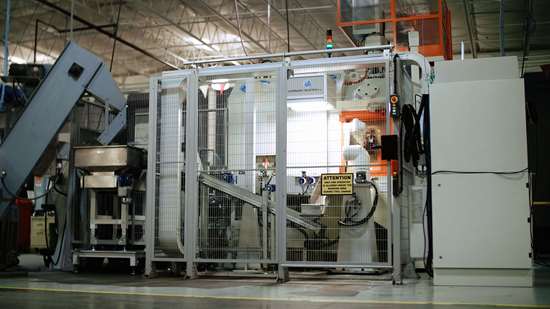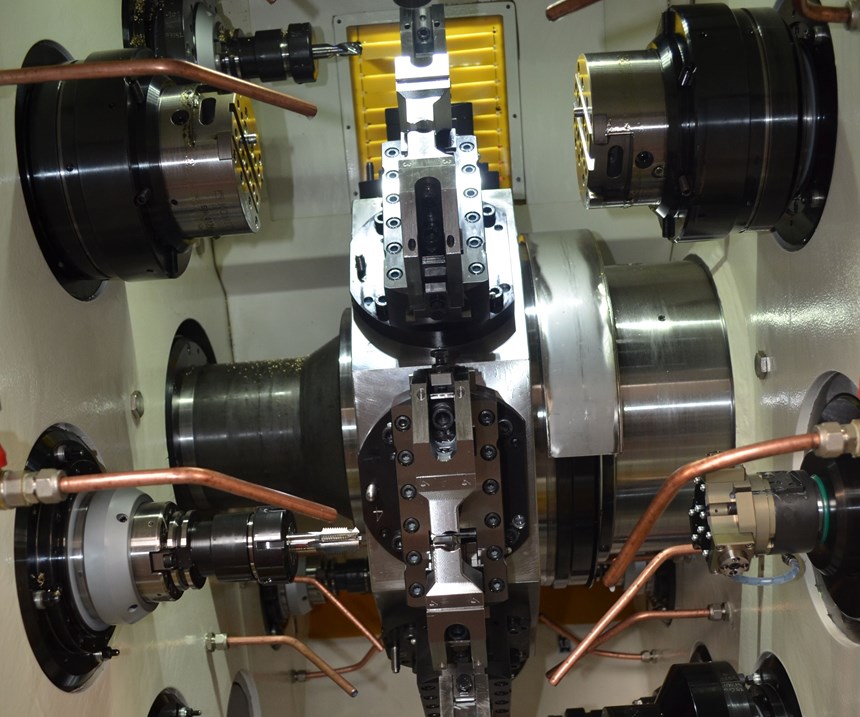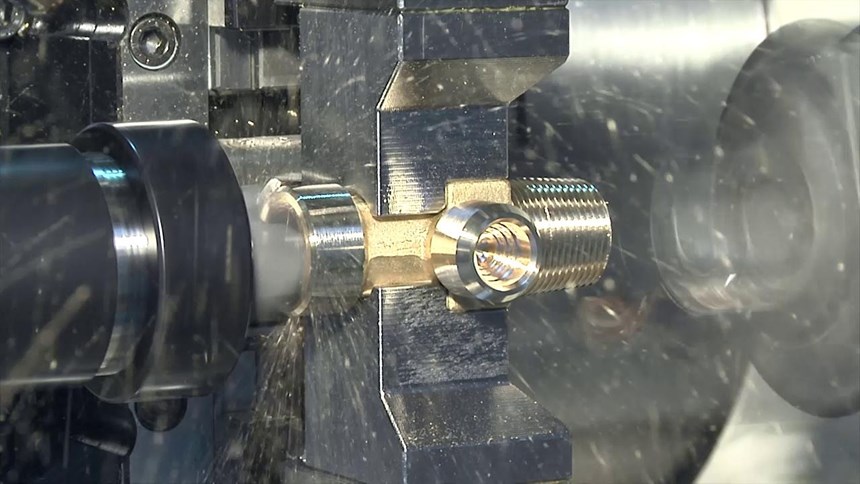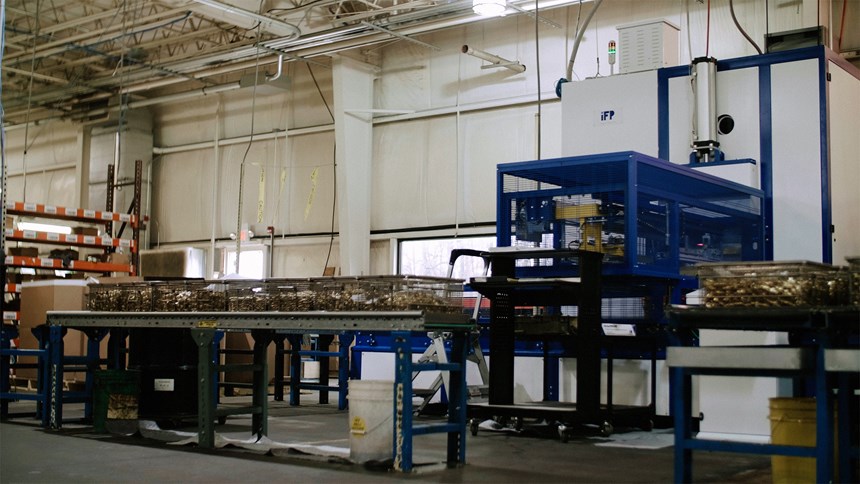Rotary Transfer Reduces Manufacturing Steps and Opens Opportunities
Appears in Print as: 'Rotary Transfer Reduces Manufacturing Steps and Opens Opportunities '
This Ohio shop has installed rotary transfer machines to reduce multiple step processing, which has increased production capacity.
Achieving complete part machining in a single handling production process is considered the “Holy Grail” for many CNC shops striving to reduce cost per part, reduce throughput to meet customer JIT delivery demands and consistently produce quality products. In some instances, adding this capability also increases both capacity and the ability to find jobs in new markets.
Typically, performing multiple machining operations with a single setup brings to mind complex, multi-sided parts for aerospace and other applications. However, the concept of reducing work-in-process by using different machining operations in with one handling is scalable even for seemingly simple products, such as brass hose fittings, which can be made better, faster and more cost-effectively by using a CNC rotary transfer machine.
Featured Content
Kevin Hessey, executive V.P. of Tramec Sloan LLC, was looking for a way to improve production of the brass airbrake hose ends and other fittings for commercial trucks and trailers made from the 9 million pounds of brass processed each year in the company’s Galion, Ohio, facility.
Tramec Sloan was formed in 2013 through the merger of three former competitors: CNC shop, Crawford Machine, Tramec (large order engineering and assembly) and Sloan (aftermarket air brake parts). Each company brought unique strengths to the new entity. Today, the company makes air handling products such as air brake valves, hoses and tubing; a variety of brass fittings and fasteners; electrical connectors, harnesses and more for commercial vehicles and other industrial applications. Products are manufactured in three plants located in Michigan, Ohio and Kansas.
In addition to streamlining his current manufacturing process, Mr. Hessey wanted to leverage the new work cell’s ability to quickly produce tight tolerance parts to not only compete with offshore and domestic producers, but to also move into previously untapped markets.
“You simply can’t compete in today’s global markets and grow your business by sticking to the old ways,” Mr. Hessey explains. “So we’re always looking for new technologies and production methods. In this case, I spoke with our raw materials supplier who had seen a BTB rotary transfer machine in another plant and suggested we look into it.”
Mr. Hessey contacted the manufacturing technology company that sells and supports BTB machines—Dayton, Ohio-based Gosiger High Volume. Gosiger’s applications engineer visited Tramec Sloan and observed its production method, which consisted of a bar feeder equipped Swiss-type lathe performing the initial turning operation, and then workers manually moving the parts to additional workstations to perform a series of secondary operations such as drilling and tapping.
To upgrade this process to both meet existing production requirements and enable expansion into the plumbing products markets, Gosiger recommended switching from turning barstock and performing secondary operations elsewhere, to beginning with a near-net, forged brass blank and performing all operations on a single BTB rotary transfer machine.
Each station of the rotary table is dedicated to a specific machining step, thereby eliminating the need for multiple workstations. Moreover, because all operations are performed on one machine without removing the part from its holding collet, the process is more repeatable, thus ensuring highly accurate parts.
The rotary transfer machine selected is a BTB TRO8S-13U, a horizontal table axis, eight station, with 13 machining units system. It includes an internal part transferring mechanism with three, two-axis recessing heads, a multi-head interface for producing plumbing drop ear fittings, and a part marking option.
The eight rotary table stations include:
- one loading and unloading station
- seven working stations
- seven threading/boring units with a CNC-controlled recirculating ballscrew and a 130-mm stroke
- six threading/boring units with a CNC-controlled recirculating ballscrew and a 130-mm stroke
- CNC recessing heads with ballscrew control and 10-mm stroke
- 1.5-inch machining capacity
This model is specifically designed for standard tees and elbows with various threads, push-to-connect fittings and simple water supply valves. All movements are servo-controlled, and the system uses standard G-code programming on a Bosch MTX control (a FANUC control is also available). The automated bulk loading system employs a vision-equipped, six-axis Staubli robot capable of 1,800 pieces-per-hour cycle times.
Because Tramec Sloan wants to move into new markets, including water supply brass plumbing fixtures that require no-lead brass, the system is equipped with high-pressure coolant delivery at 1,000 psi to compensate for the increased friction-produced heat and to break up chips for better accuracy and longer tool life.
According to Mr. Hessey, using the near-net shape forging with the new system reduces material costs by up to 40 percent, depending on the part. That, alone, is a significant cost savings. Additionally, setup times are reduced by 75 percent, and eliminating the need for secondary operations reduces costs by another 25 percent.
“I’m extremely satisfied with the results,” Mr. Hessey says. “The system flawlessly churns out about 300,000 of our traditional parts each month and has the capacity we need to take on the new customers in the plumbing market we recently acquired. These are customers we could not have competed for using the old methods.”
Another reason Tramec Sloan is able to appeal to these new customers is the addition of an iFP Kleen Power vacuum parts washer, also from Gosiger High Volume. “We looked at plumbing parts made in countries without the environmental controls we have in the U.S. that look beautifully clean and bright,” Mr. Hessey says. “We want that same appearance, but without harming the planet. This parts washer does exactly that.”
The programmable iFP parts washer cleans baskets of parts in a sealed chamber using hydrocarbons or modified alcohol-based solutions. The solutions are then internally recycled through a distillation process, thus protecting the environment and saving money by recapturing and reusing the cleaning agents.
Because different parts present a variety of cleaning challenges, the Kleen Power system incorporates spraying, immersion, submerged jets, ultrasonic and vapor cleaning options. These variables can be applied either statically or by adding oscillation and/or rotation.
In operation, the baskets of parts are loaded into the cleaner, sealing the cleaning chamber. A pump pulls the air out of the chamber to create a vacuum, and the chamber is filled with the appropriate solvent. The part cleaning program for each specific part determines the cleaning actions and timing. When the cleaning cycle is complete, the solvent is drained from the chamber and the system creates a vacuum to remove all remaining fluids and residue to leave the parts completely clean. The recaptured solvent is distilled and internally recycled for future use.
The experience of changing manufacturing processes and adding cleaning capability has proven to be a positive experience for Tramec Sloan. “The BTB system does precisely what we needed it to do and has opened the door to new opportunities that make the ROI very attractive,” Mr. Hessey says.
RELATED CONTENT
-
Beyond One and Done
Rotary transfer machining is one proven solution for high volume machining. Today’s CNC rotary transfer machines provide more than “set it and forget it” production; they are flexible enough for high mix and low volume production demands.
-
Rotary Transfer Versus Swiss for Small Precision Parts
A little creativity goes a long way in meeting the challenges that this high-production application presents.
-
Pallet-Transfer Multi-Spindle Machining Center Defies Classification
Increasingly, new machine tools are being developed that defy existing classification code by virtue of their multi-tasking capabilities.










